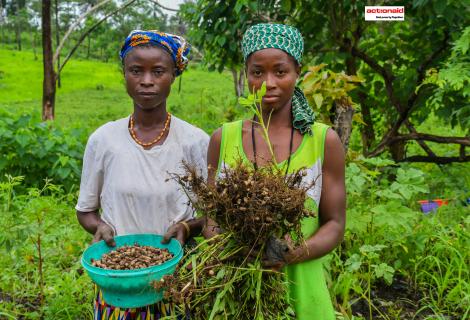ENDURING THE IMPACT: FEMALE FARMERS STRUGGLE WITH LOW CROP YEILDS AMIDST CLIMATE CRISIS

Climate change has had a significant impact on agriculture in Sierra Leone, exacerbating the existing challenges of low productivity and food insecurity. Those impact including erratic rainfall patterns, prolonged droughts, and increased occurrences of extreme weather events like flood and storms, farming activities are disrupted, and even lower crop yield recorded.
“Both my parents are farmers; I grew up with an awareness of the significance of farm work in our household.” Stated Kaday Conteh in Pelewa, Bombali District. “My lineage solely depends on Agriculture as a source of livelihood and just like them, it has aided in providing for my family and school needs. With high expectations, I planted only groundnuts in this farming season. I hoped that with the profit from it, I could pay all my debts and have some cash to settle our basic needs.” Kaday’s expectation was shattered as a result of the devasting impact of climate change. She and many other women farmers in Pelewa battle with the harsh effects of erratic rainfall patterns, rising temperatures, and soil infertility.
In rural communities, climate change is exacerbating the vulnerabilities of female farmers even though most of them count on agriculture to financially sustain themselves. The 19-year-old farmer who’s a mother of one added, “At the start of the planting season, I brought 10 baskets of groundnut at Le50 per basket. The money I used to buy the groundnut is a loan which I have not been able to repay as I harvested almost nothing. Now I’m scared I will be summoned by the chief concerning payment to the person I owe. If I’m unable to pay in time, the matter will be taken to police, and I will be in huge trouble.”
“We strictly follow our traditional methods of farming so this change in our crop production is strange. We cannot say what exactly has caused this. This situation has prompted some farmers to leave agriculture and that is not good for the community as our food security is at stake.”
Kaday and many others like her are certainly discovering advanced ways to cope with the challenges they face. They are part of a women’s farming cooperative to support one another, share information and resources, encouraging sustainable practices. In spite of all odds, they stay resolute to secure their families’ sustenance and contribute to their community. In her words, “women farmers in this community work in solidarity especially during these times, when the farming experience is dreary. We collectively work in one person’s farm whenever it is necessary; that has kept us going and be more productive.”
47-year-old Mabinty Kamara who is a mother of six faces the same challenges as Kaday “Yesterday I went to my farmland to harvest some groundnuts. I spent the whole day there without getting a bagful. When uprooted, most of the plants have no seed while others have quite a little.” She lamented while working at Kaday’s farm.
“Agriculture is my only source of livelihood. At this point I don’t know how my family with survive for the rest of the year. We live in shambles as a result of a situation we did nothing to cause. This is not how it used to be. We used to plant on a small piece of land and yield plentiful harvest. Last year we couldn’t complete combing through our farmlands, in one day we harvested bags and bags of groundnut. Now, I planted groundnuts in over two acres of land and haven’t harvested more than two bags in total”, she continued.
“We ask that solutions be found for this predicament we are facing. If Agriculture that we depend on no longer work for us, how will we survive?”, Mabinty concluded.
